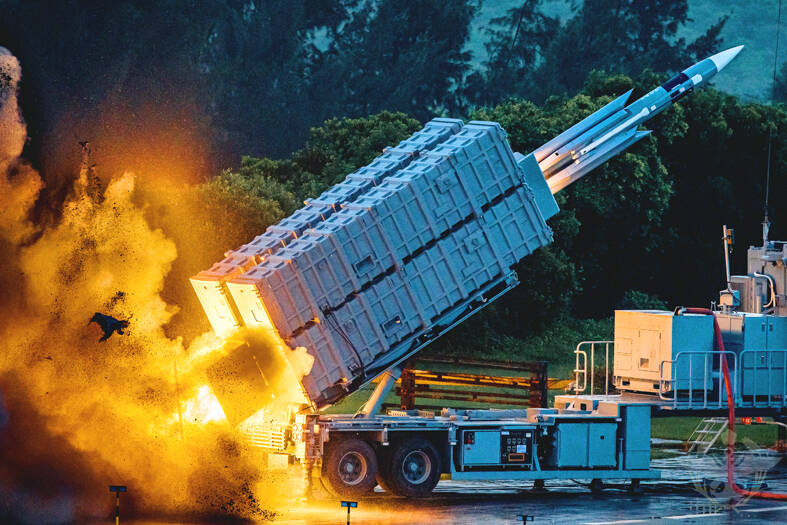The military could establish a new combatant command as early as 2026, which would be tasked with defending Taiwan’s territorial waters 24 nautical miles (44.4km) from the nation’s coastline, a source familiar with the matter said yesterday.
The new command, which would fall under the Naval Command Headquarters, would be led by a vice admiral and integrate existing fast attack boat and anti-ship missile groups, along with the Naval Maritime Surveillance and Reconnaissance Command, said the source, who asked to remain anonymous.
It could be launched by 2026, but details are being discussed and no final timetable has been announced, the source said.

Photo: The Ministry of National Defense via EPA-EFE
According to international maritime rules, coastal states may claim a territorial sea that extends up to 12 nautical miles from their shoreline. A nation’s contiguous zone is an area that is adjacent to the territorial sea and extends 24 nautical miles from the coastline.
The littoral combatant command would be responsible for integrating maritime surveillance, strike and communication capabilities, as well as mobile coastal units, the Naval Command Headquarters said.
The plan is still being discussed and evaluated, the navy said.
Three defense academics said that the new command would benefit the military’s reforms and overall defense.
As the proposed command would be responsible for defending Taiwan within 24 nautical miles of its coastline, it would have separate responsibilities from the Naval Fleet Command, which would likely oversee the defense of seas further away from Taiwan’s shoreline, said Su Tzu-yun (蘇紫雲), a research fellow at Taiwan’s state-run Institute for National Defense and Security Research.
He applauded what he called the structural reform of the navy.
Academic and retired navy captain Jiang Hsin-biao (江炘杓) said that once established, the new command would likely use smaller and lighter missile boats and corvettes, as well as coastal anti-ship missiles.
The navy’s main larger combat vessels would then be tasked with defending the seas around Taiwan, further away from the coast, he said.
That would mean the new command would share the responsibility of defending the country with the main combat ships and Naval Fleet Command, he added.
However, many other combat commands from other military branches, including the air force and army, are also responsible for defending areas within 24 nautical miles of the coastline, said Chieh Chung (揭仲), a researcher at the Taipei-based Association of Strategic Foresight.
Another new command could further complicate the command structure of the nation’s armed forces in the event of a war, Chieh said.

CHAMPIONS: President Lai congratulated the players’ outstanding performance, cheering them for marking a new milestone in the nation’s baseball history Taiwan on Sunday won their first Little League Baseball World Series (LLBWS) title in 29 years, as Taipei’s Dong Yuan Elementary School defeated a team from Las Vegas 7-0 in the championship game in South Williamsport, Pennsylvania. It was Taiwan’s first championship in the annual tournament since 1996, ending a nearly three-decade drought. “It has been a very long time ... and we finally made it,” Taiwan manager Lai Min-nan (賴敏男) said after the game. Lai said he last managed a Dong Yuan team in at the South Williamsport in 2015, when they were eliminated after four games. “There is

Chinese Nationalist Party (KMT) lawmakers have declared they survived recall votes to remove them from office today, although official results are still pending as the vote counting continues. Although final tallies from the Central Election Commission (CEC) are still pending, preliminary results indicate that the recall campaigns against all seven KMT lawmakers have fallen short. As of 6:10 pm, Taichung Legislators Yen Kuan-heng (顏寬恒) and Yang Chiung-ying (楊瓊瓔), Hsinchu County Legislator Lin Szu-ming (林思銘), Nantou County Legislator Ma Wen-chun (馬文君) and New Taipei City Legislator Lo Ming-tsai (羅明才) had all announced they

Nvidia Corp CEO Jensen Huang (黃仁勳) yesterday visited Taiwan Semiconductor Manufacturing Co (TSMC, 台積電), as the chipmaker prepares for volume production of Nvidia’s next-generation artificial intelligence (AI) chips. It was Huang’s third trip to Taiwan this year, indicating that Nvidia’s supply chain is deeply connected to Taiwan. Its partners also include packager Siliconware Precision Industries Co (矽品精密) and server makers Hon Hai Precision Industry Co (鴻海精密) and Quanta Computer Inc (廣達). “My main purpose is to visit TSMC,” Huang said yesterday. “As you know, we have next-generation architecture called Rubin. Rubin is very advanced. We have now taped out six brand new

POWER PLANT POLL: The TPP said the number of ‘yes’ votes showed that the energy policy should be corrected, and the KMT said the result was a win for the people’s voice The government does not rule out advanced nuclear energy generation if it meets the government’s three prerequisites, President William Lai (賴清德) said last night after the number of votes in favor of restarting a nuclear power plant outnumbered the “no” votes in a referendum yesterday. The referendum failed to pass, despite getting more “yes” votes, as the Referendum Act (公民投票法) states that the vote would only pass if the votes in favor account for more than one-fourth of the total number of eligible voters and outnumber the opposing votes. Yesterday’s referendum question was: “Do you agree that the Ma-anshan Nuclear Power Plant